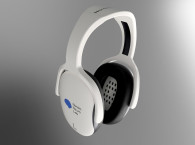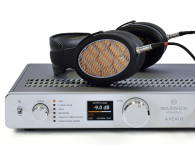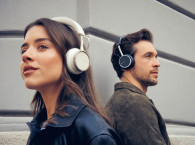
Audeze currently offers planar magnetic headphones for multiple markets, from reference monitoring and high end audio experiences, all the way to sophisticated designs for gaming featuring head-tracking and spatial audio processing. Now, working in cooperation with SMRT Image, Audeze announces a breakthrough development that they believe can help improve patient comfort, and to support neuroscience research projects.
Prof. Mark S. Cohen Ph.D., UCLA Depts of Psychiatry, Neurology Radiology, Psychology, Biomedical Physics and BioEngineering, is a pioneer in the field of magnetic resonance imaging (MRI) and neuroscience. He is also the Co-Founder and Chief Scientist at SMRT Image where he is helping to solve some of the most challenging patient comfort problems with MRI.

Working with Dr. Cohen and his team at SMRT Image, Audeze helped develop new headphones that alleviate many of the acoustic issues associated with MRI testing. The problem, as SMRT Image identified, is related to patient anxiety and discomfort due to noise and claustrophobia during MRI exams. When patients do not remain still, motion artifacts often degrade the images and can even make the scans unusable for diagnostic purposes. Stress and anxiety can cause patients to abort a scan, or to refuse studies altogether. MRI machines are extremely loud: their sound pressure levels can exceed 120dB - similar to a jack hammer a few feet away.
MRI machines are also, by nature, an exceptionally hostile environment for any electronics. They require enormous magnetic and electrical fields to make their medical images. Further, MRI scans are highly sensitive to electrical noise, which can compromise image quality. Because of this, any headphones used inside the scanners must be devoid of any ferrous materials. Moreover, eddy currents can also be induced in metal parts, creating image quality problems.
Audeze created a new transducer technology, designed from the ground up, to eliminate the problems with use in MRI. Starting with a patented thin-film diaphragm with embedded Carbon Nanotubes that provide an ideal environment for electrostatic charge, the headphones use electrostatic force to create sound. This design solves many of the inherent issues with coated diaphragms that have been used in previous electrostatic speaker designs over the last century.
To cancel the extremely high levels of noise in the MRI units, the Audeze team created very high SPL transducers that are also very accurate; a critical requirement for effective Acoustic noise cancellation (ANC), which works by creating a signal that is opposite to the noise signal. By adding ANC to the CRBN headphones, Audeze created a solution that offers unique advantages for many other medical applications.
The SMRTImage team worked with a variety of MRI labs to refine the design of the headphones to be compatible with the majority of scanners and exams - usable with body coils, surface coils, and some head coils. The Audeze/SMRT over-the-ear models provide state-of-the-art passive and active noise reduction techniques. Audeze's new CRBN films are very versatile, and can be used to create transducers of different sizes including smaller headphones that fit smaller heads of pediatric patients.
"CRBN headphones was a chance for us to make headphones that have a purpose and measurable social impact," says Audeze CEO Sankar Thiagasamudram.
The CRBN headphones are integrated into the Lumica AV system from SMRT Image that provides images and movies in addition to audio and communication options, resulting in a fully-immersive audiovisual experience that is both comforting and distracting for the anxious MRI patient.


"What we set out to do at SMRT was create a tranquil patient experience within a very hostile environment," says Tylor Garland, CEO of SMRT Image. "Our ability to produce a hi-fi AV product that is MR compatible, and which a patient can comfortably wear over the course of a long scan in a confined environment, was very tricky. We were lucky to find Audeze to help us with our solution," he added.
A recent study, reported by Dr. Lawrence Tanenbaum of RadNet, has demonstrated the effectiveness. In a controlled survey study of 295 imaging subjects, using scanners from both Siemens and General Electric, patients reported significant improvements in their Comfort, Anxiety, and overall experience. Remarkably, when using the Lumica AV System, these same patients even reported decreases in the perceived exam duration.
Based in Los Angeles, CA, SMRT Image will launch its first product, Lumica in Q4 of 2021. Lumica is an integrated audio-video solution offering superior patient comfort, two-way communication, and fMRI brain mapping capabilities for both clinical and research applications. Without interrupting workflows, MRI operators can provide patients with a relaxing home theater-like experience, reducing stress and anxiety for the patient.
Using the same carbon nanotube polymer and transducer technology developed for this medical project, Audeze has also designed the new Audeze CRBN Electrostatic headphones (pictured below), a top-of-the-line, reference design that the brand will be announcing separately. Orders for the new flagship CRBN Electrostatic Headphone ($4,500.00) can be placed already on the Audeze website.
www.audeze.com







